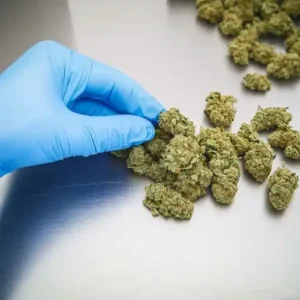Skunk Cannabis is never far away from the headlines. Users of the drug have been linked with various mental health disorders, such as schizophrenia and psychosis. Some have even been dubbed “psychotic wrecks” by the media after using the high-strength drug.
So what do we really know about this highly controversial drug? Here are some of the main facts that we can confirm:
The facts about Skunk Cannabis
The active ingredient of Cannabis is THC, or tetrahydrocannabinol. Skunk Cannabis is a much stronger variant of the drug as the levels of THC contained in it are often 2 to 3 times higher than for regular cannabis. The level of THC content typically ranges between 15% and 25%. Because of this high THC content, skunk cannabis has been known to produce a variety of effects when consumed. Many users report feeling an intense, upbeat high that can be quite long-lasting.
Skunk was originally developed in the USA by crossing two types of cannabis plant. It then moved across to Europe, where it was grown in glasshouses. European skunk cannabis was developed in Holland in the 1970s by cultivators who crossed several different varieties of cannabis together. It is typically a hybrid blend of sativa and indica varieties, which is why it has a wide range of effects on its consumers.
The drug is grown very quickly. It is made from the buds of the cannabis plant and is normally light green in colour.
Despite much media outcry which has linked the drug to a variety of mental health problems, we are still struggling to find evidence of a clear link.
In 2009, David Nutt, a government advisor on drugs stated that there had been no obvious rise in schizophrenia in skunk users in the UK, even though the drug had been on sale in the country for over a decade. In fact, levels of schizophrenia and psychosis amongst the population were on a downward trend, despite an increasing popularity of cannabis use in the last 30 years.
However, the NHS advises anybody that has a history of mental illness, personally or within their family, to avoid using cannabis. in order to avoid the risk of the drug causing mental health problems.
The Royal College of Psychiatrists estimated that 10% of all people that try cannabis end up having a bad experience when using it. They suggest that long-term use of the drug can have a depressant effect and may well reduce a person’s motivation.
Use and supply of the drug in 2018 is still common in the United Kingdom. High-strength strands of skunk, with street names such as Stardog, Strawberry Gelato and Amnesia have been selling for three times the price of gold. The drugs have even managed to appear on Amazon Marketplace!
What are the effects of Skunk Cannabis?
The effects of using skunk are very similar to those of cannabis, although they may be more intense of take effect quicker. Known side-effects of the drug include relaxation and an altered perception of time. Talking more and become very hungry (“getting the munchies”) are commonly experienced. Similarly, anxiety, mild paranoia and nervousness are some of the less pleasant feelings associated with the drug.
The compounds in skunk cannabis will build up in the body after use, being stored in fatty tissue. This means that the drug can be traced in the body for up to two months after last use. The quickest and easiest way to check if your body is “clear” of THC is by taking a urine drug test for cannabis.
Is Skunk Cannabis Illegal?
Skunk Cannabis is illegal in the UK. It is a Class B drug, meaning that it carries the same penalties as other drugs of abuse such as speed, mephedrone (meow meow) and barbiturates.
Getting caught in possession of the drug could result in up to five years in jail. Dealing the drug could lead to a maximum prison sentence of 14 years.
In the United Kingdom, skunk cannabis remains strictly illegal. Possession of even small quantities could result in jail time. Although some people argue that it is a harmless substance, the government still classifies skunk as a dangerous drug under the law. Selling or distributing skunk carries even harsher penalties, potentially leading to lengthy prison sentences.
Attitudes towards cannabis are evolving in some parts of the world. Places like Canada and certain U.S. states have legalized marijuana for recreational use. However, this trend has not changed the legal status of skunk in Britain. Smoking cannabis in public here is not just socially unacceptable, it is a criminal offense.
Unless you are willing to risk your freedom for a few pungent puffs of this potent cannabis strain, it is wise to avoid skunk altogether. The distinctive smell alone provides probable cause for the police to conduct a search. Getting caught up in the legal consequences over a bag of strong marijuana is not worth it. There are no exceptions or loopholes when it comes to the law on this matter. In the U.K., skunk is unequivocally illegal.
The Future of Skunk Cannabis
While skunk remains illegal today, there is a chance its legal status could change in the coming years. Some countries have already decriminalised or fully legalised recreational cannabis, while others allow medical marijuana. If more places take this route, the UK may eventually follow suit.
Full legalisation could mean skunk and other high potency strains become more widely available. This could make the drug seem less taboo and exotic to new users. However tighter regulations around THC content and sales practices would be needed to protect public health.
Cannabis consumption lounges like those found in parts of the USA and Canada would be one option for safe, controlled skunk use. Staff could provide guidance to inexperienced consumers while onsite testing confirms potency. Such spaces would also prevent unintended exposure compared to public smoking.
If skunk was fully legalised, we would also likely see the emergence of cannabis drug testing services. Those about to drive or operate machinery could drop in to check they are not still impaired from earlier use. Urine, saliva and swab tests tailored to skunk’s distinctive cannabinoid profile would quickly indicate recency of consumption and intoxication levels.
There would still be strict bans around working or driving while impaired of course. So roadside drug testing equipment and employer screening policies would need enhancement too. Police could rapidly detect skunk use with advanced roadside oral fluid scanners linked to national databases. And workplace urine testing cut-offs would be lowered to catch more occasional skunk smokers prone to on-site impairment.
For now though, skunk remains unambiguously illegal. And while a episodes of psychosis associated with very heavy use have been documented, moderate consumption seems to pose limited mental health risks to healthy adults. But all users should remain aware that every batch can vary radically in potency and purity. Being alert to the early signs of an adverse reaction is always wise.
Photo by Anthony Cunningham at Zoom Testing
Zoom Testing is a leading UK drug testing company and a supplier of Drug Test Kits.





